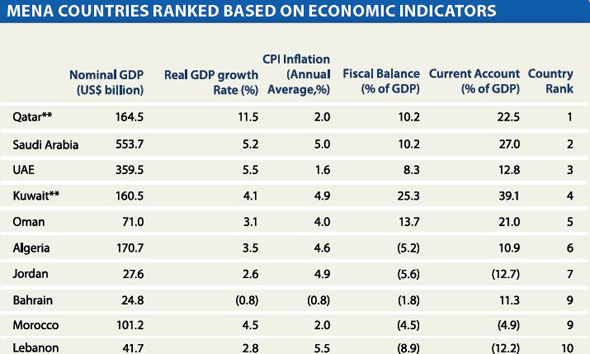EFG Hermes: MENA’s Real GDP Growth at 4.5% In 2011
EFG Hermes maintained their economic forecasts, despite the sharply weakening global growth outlook.

In their recently released “MENA Macroeconomics Quarterly- 4Q2011: Withstanding Global Jitters”, EFG Hermes maintained their economic forecasts, despite the sharply weakening global growth outlook. Real GDP growth for the 11 MENA countries covered in the report is forecast at 4.5% in 2011. The forecasts are based on a further deceleration of global growth in the fourth quarter of 2011, led by the Eurozone and weak growth in the US.
… the MENA region stands out due to the dominance of hydrocarbon and services.
The report indicated that with open economies, the external developments are important for regional economies. However, the MENA region stands out due to the dominance of hydrocarbon and services. In addition, the global oil price has suffered less of a correction and has been more stable than other asset classes. The oil price has remained at a comfortable level for GCC producers, with the exception of Bahrain. EFG Hermes believes the resilience of the oil price is largely a result of tightness in the physical oil market, with demand still growing from Asian economies, albeit at a weaker pace. Gas prices have also remained supported, with some gas markets continuing to see increasing demand. For Jordan, commodities and commodity-based exports also make up an important share of exports through phosphates and fertilizers. Jordan has also benefited from higher prices in these sectors.
It is worth noting that EFG Hermes considered Dubai standing out in the region as it is benefiting from its ‘safe haven status’, particularly in areas such as tourism, trade and banking sector deposit inflows. This has strengthened the external recovery and fed into domestic sectors as well. The bank also expects to see support from Abu Dhabi for debt servicing, if required as a result of the global market turmoil.
The report also noted that so far there have been limited signs of the global developments, including the fall in oil price from the second quarter of 2011, feeding into the domestic GCC region, with little evidence of deterioration in sentiment. This is largely seen as a result of the strong government spending programs. The fact that the oil price has remained relatively supported has also helped. There have been some signs of moderation in domestic demand in Saudi Arabia after the immediate impact of the stimulus package, but overall domestic activity remains notably higher on a year-on-year basis. For Qatar, a sharp increase in sentiment is expected after the government substantially increased wages in August. Finally, EFG Hermes forecast a stronger economic performance in the oil exporting countries that benefit from higher government spending and a lower reliance on tourism revenue.
The article above has been published as a part of Bank Audi`s MENA Weekly Monitor of Week 42 (2011). It can be accessed via Internet at the following web address: http://www.banqueaudi.com